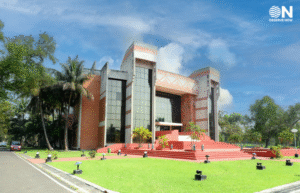ObserveNow Media is gearing up to host the much-anticipated 3rd edition of the Digital Bharat Summit Uttar Pradesh, scheduled to take place on July 26, 2024, at the iconic Taj Mahal Lucknow in Gomti Nagar. This summit, themed “Empowering Citizens with Digital Governance & Investment Opportunities for IT Sector,” is set to be a landmark event in the realm of digital transformation and governance.
The summit is hosted by the Department of IT & Electronics, Government of Uttar Pradesh, with support from Meity Startup Hub and Invest UP, underscoring their commitment to fostering innovation and growth in the IT sector.
The overarching objective of the Digital Bharat Summit Uttar Pradesh is to bring together leaders and stakeholders from various sectors, including government departments, public sector undertakings (PSUs), and industries, alongside experts and thought leaders. This platform serves as a catalyst for collaboration and idea exchange, aimed at driving digital initiatives and enhancing governance efficiency across the state.
The event will involve several partners advancing this initiative further, including Lucknow Smart City and Lucknow Nagar Nigam with RAHAT as a supporting partner, AutoDesk as the Design & Make Partner, Sify, and Worldline as Platinum Partners, Salesforce as the AI CRM Partner, ESDS as the Digital Transformation Partner, Airtel Payments Bank as the Banking Innovation Partner, NEC as the Social Innovation Partner, Canon as the Printing & Digitization Partner, DEV IT SERV as the End User Computing Solution Partner, Tally as the Business Automation Partner, and EDB along with Datamato | Gitlab as exhibitors.
The summit will commence with a warm welcome by Taniya Tikoo, Co-founder & Editor-in-Chief of ObserveNow Media, setting the tone for the day’s discussions. The inaugural session, chaired by Anil Kumar Sagar, IAS, Principal Secretary, Department of Information Technology, Government of Uttar Pradesh, will explore “How Uttar Pradesh is Empowering Citizens with Digital Governance & Investment Opportunities for IT Sector.” Distinguished panelists include Mahaveer Singhvi, IFS, Joint Secretary, Ministry of External Affairs, Government of India; Bhuvnesh Kumar, IAS, Additional Secretary, Ministry of Electronics & Information Technology, Government of India; Amrit Abhijat, IAS, Principal Secretary, Urban Development, Government of Uttar Pradesh; Lt. General Vinod G. Khandare, Principal Adviser, Ministry of Defense, Government of India; and Awanish Kumar Awasthi, Advisor to Chief Minister, Government of Uttar Pradesh. The chief guest for the day will be Sunil Kumar Sharma, Hon’ble Minister for Information Technology & Electronics, Government of Uttar Pradesh, underscoring the government’s commitment to digital advancement.
A highlight of the summit will be the signing of Memorandum of Understanding (MOU) between the UP Government and Bhashini, marking a significant step towards collaboration and innovation in the IT sector.
Abhishek Prakash, IAS, Secretary, Department of Infrastructure & Industries & CEO, Invest UP, Government of Uttar Pradesh, will deliver a keynote address, outlining strategic initiatives and investment opportunities in the state’s IT sector.
The summit will feature several engaging panel discussions:
1. Leveraging Digital India Initiatives through Technology-based Solutions for Governance & Public Service Deliveries: This session will explore innovative solutions and best practices in digital governance, featuring leaders from UP State Institute of Forensic Sciences, Ministry of Communications, Tourism & Culture Department, Income Tax Department, Digital India Bhashini Division, and industry experts. NSN Murthy, Partner & Leader, Government & Public Services, Deloitte Consulting, will moderate the discussion.
2. Digital Transformation of States for Effective Governance- Through Emerging Technologies: Panelists including secretaries and directors from various state and central departments, IIIT Lucknow, Salesforce, and ESDS Software Solution Ltd, will discuss the role of emerging technologies in transforming governance. Jaspreet Singh, Partner and Clients and Markets Leader – Advisory Services, Grant Thornton Bharat LLP, will moderate this insightful session.
3. Building Digitally Resilient Smart Cities of Tomorrow: The panel will delve into the strategies and innovations driving smart city initiatives across India, moderated by Alok Sharma, Director – AEC, India & SAARC, Autodesk.
Special Address:
Nitin Mishra, Chief Technology Officer, ONDC, will deliver a special address, highlighting technological advancements and their impact on governance and public services.
Fireside Chat:
A fireside chat on “Financial Inclusion Through Digital Banking,” moderated by Taniya Tikoo, will feature Sameer Verma, IAS, Special Secretary (Finance) & Registrar, Firms & Societies, Government of Uttar Pradesh, and Ganesh Ananthanarayanan, COO, Airtel Payments Bank. This session will explore the role of digital banking in promoting financial inclusion and economic growth.
Final Panel Discussion:
The summit will culminate with a panel discussion on “Powering Progress: The Role of Public-Private Partnerships in Digital Transformation.” Sunny Kapoor, Director, Technology Consulting Government & Public Sector, Ernst & Young LLP, will moderate this session, featuring representatives from Uttar Pradesh Power Corporation Ltd, Madhyanchal Vidyut Vitran Nigam, UP State Road Transport Corporation, WEBEL, Noida Centre of Excellence, and NIC Lucknow.
The Digital Bharat Summit Uttar Pradesh 2024 promises to be an enlightening and transformative event, fostering collaboration among government leaders, policymakers, and technology experts. It seeks to explore innovative solutions and pave the way for a digitally empowered future for Uttar Pradesh and beyond.
























